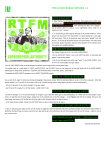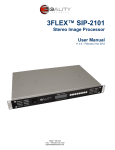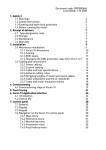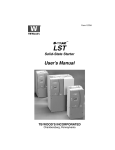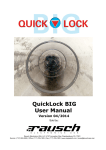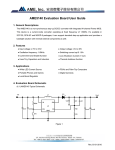Download LENGTH-ANGLE-RADIUS-LOAD INDICATING SYSTEM
Transcript
www.hirschmann.com Hirschmann, Inc. LENGTH-ANGLE-RADIUS-LOAD INDICATING SYSTEM Mentor EI65 SERVICE MANUAL P/N 190234 Rev.E, 02/02/10 MENTOR EI65 SERVICE MANUAL NOTICE The information in this document is subject to change without notice. Hirschmann makes no warranty of any kind with regard to this material, including, but not limited to the implied warranties of merchantability and fitness for a particular purpose. Hirschmann shall not be liable for errors contained herein or for incidental or consequential damages in connection with the furnishing, performance or use of this manual. This document contains proprietary information, which is protected by copyright. All rights are reserved. No part of this document may be photocopied, reproduced, or translated to another language without prior consent of Hirschmann. © 2009 Hirschmann, Chambersburg, PA 17201, USA © Hirschmann Automation and Control Rev. - 02/02/10 190234_E.doc MENTOR EI65 SERVICE MANUAL Table of Contents 1 GENERAL INFORMATION............................................................................................. 1 REFERENCE: ............................................................................................................................... 1 SYSTEM MALFUNCTION: ........................................................................................................... 1 SYSTEM DESCRIPTION: ............................................................................................................. 1 2 WARNINGS .................................................................................................................... 2 3 TROUBLESHOOTING USING THE ANALOG VALUES SCREEN................................ 3 4 TROUBLESHOOTING FLOW CHARTS......................................................................... 4 4.1 4.2 4.3 4.4 4.5 4.6 GENERAL FLOW CHART ......................................................................................................... 4 NO DISPLAY.............................................................................................................................. 5 ANTI TWO BLOCK PROBLEM .................................................................................................. 6 ANGLE READING PROBLEM ................................................................................................... 8 LENGTH READING PROBLEM ................................................................................................. 9 LOAD READING PROBLEM ................................................................................................... 11 5 ERROR CODE TABLE ................................................................................................. 13 6 SYSTEM DRAWINGS................................................................................................... 15 6.1 DRAWING 1. SYSTEM WIRING DIAGRAM ............................................................................. 16 6.2 DRAWING 2. SYSTEM WIRING DIAGRAM, LINKBELT .......................................................... 21 6.3 DRAWING 3. CONNECTION BOARD LAYOUT....................................................................... 23 6.4 DRAWING 4, ANGLE SENSOR CIRCUIT ................................................................................ 24 6.5 DRAWING 5, LENGTH SENSOR CIRCUIT.............................................................................. 25 6.6 DRAWING 6, LINERIDER CIRCUIT ......................................................................................... 26 6.7 CAN-BUS COMMUNICATION ................................................................................................. 26 6.7.1 Troubleshooting TEXT CAN BUS ERROR ................................................................. 27 6.8 DRAWING 7, LINERIDER SUPPLY VOLTAGES ..................................................................... 28 6.9 SPARE PARTS LISTINGS ....................................................................................................... 29 © Hirschmann Automation and Control Rev. - 02/02/10 190234_E.doc GENERAL INFORMATION 1 1 GENERAL INFORMATION The purpose of this service manual is to provide additional information to assist a service or maintenance person in identifying malfunctions or system problems with the Mentor EI65 System. A digital voltmeter and regular maintenance and service tools will be required to troubleshoot the system. Note: Knowledge of how to use a digital voltmeter is assumed. REFERENCE: Operator’s Manual 190231 Calibration Manual 190232 Installation Manual 190233 SYSTEM MALFUNCTION: In case of a malfunction of the system, a code that identifies the system malfunction will be displayed in the upper right portion of 88780 lb the display. The error codes are listed in Section 5, Error Codes. 90000 lb The table identifies various faults that can occur with the Mentor 47.7 MAIN 3 EI65, explain each fault, and describe the action, which shall be taken to correct the fault. Faults within the electronic microprocessor shall be repaired by factory trained service personnel. When these faults occur, contact your authorized dealer or service organization. E71 74.6 67.3 64.9 If the operator identifies a possible problem in the system, perform the pre-operation inspection Section 5 in the Operator’s Manual to define the problem. SYSTEM DESCRIPTION: The Length-Angle-Radius-Load Indicator System Mentor EI65 has been designed to provide the crane operator with the essential information required to enable the machine to be used within its design parameters. The Mentor EI65 System indicates the length and angle of the boom, tip height, working radius and the total weight being lifted by the crane. Using the various sensors and the limits set by the operator, the Mentor EI65 System warns the crane operator of certain approaching hazardous conditions which could occur during the operation of his crane. WARNING Always refer to operational instructions and load charts provided by the crane manufacturer for specific crane operation and load limits. © Hirschmann Automation and Control Rev. - 02/02/10 190234_E.doc 2 MENTOR EI65 SERVICE MANUAL 2 WARNINGS • The Mentor EI65 is an operational aid, which warns a crane operator of certain approaching hazardous conditions, which could cause damage to equipment and personnel. • The device is not, and shall not be, a substitute for good operator judgment, experience and use of accepted safe crane operating procedures. • The responsibility for the safe operation of the crane shall remain with the crane operator who shall ensure that all warnings and instructions supplied are fully understood and observed. • Prior to operating the crane, the operator must carefully and thoroughly read and understand the information in the operator’s manual to ensure that he/she knows the operation and limitations of the indicating system and crane. © Hirschmann Automation and Control Rev. - 02/02/10 190234_E.doc Troubleshooting Using The Analog Values Screen 3 3 TROUBLESHOOTING USING THE ANALOG VALUES SCREEN For a sensor error or problem with a sensor, look at the output voltage of the linerider and angle sensors and compare the reading with the following: Angle sensor 1.875 at 0°, 2.5 at 45°, or 3.125 at 90° Linerider under no load is 0 to 15mV not to exceed 2500 mV. To access the analog output screen use the following procedure. 1. Power up the system. The screen will display Mentor EI65, with the software version and date. 2. When the startup screen shows MENTOR EI65 and the startup version, press the “i” button to enter the service mode. The screen will change to “CALIB. PASSWORD”. 3. Enter the calibration password “0815”. Use the “UP” and “DOWN” buttons to select the number and the “OK” button to confirm each entry. Enter 0 — OK, 8 — OK, 1 — OK, 5 — OK 4. Scroll to the ANALOG VALUES screen by pressing the “UP” or “DOWN” arrows, pressing “OK” to select and show the following screen. All Analog input voltages (shown in millivolts), received from the sensors will be displayed here as described below. The values shown in the screen below are random. Load 1 Angle 2 Angle 1 Length Load 2 © Hirschmann Automation and Control Rev. - 02/02/10 190234_E.doc 4 MENTOR EI65 SERVICE MANUAL 4 TROUBLESHOOTING FLOW CHARTS This section explains how to handle a problem that may arise with the Mentor EI65 Load Indicator System. The procedures are easy to follow and are given in flowcharts on the following pages. Start with the general flowchart below that will guide you to one of the detailed flowcharts shown in this section. Section 6 contains the necessary drawings needed for troubleshooting. 4.1 GENERAL FLOW CHART START What’s wrong? No display Go to Section 4.2 Anti-Two Block Problem Go to Section 4.3 Angle Reading Problem Go to Section 4.4 Length Reading Problem Go to Section 4.5 Load Reading Problem Go to Section 4.6 © Hirschmann Automation and Control Rev. - 02/02/10 190234_E.doc NO DISPLAY PROBLEM 4.2 5 NO DISPLAY PROBLEM: Blank console display with no warning light shown. Start Measure crane voltage and verify to be between +12V and +30V Correct? No Check crane power supply for faulty crane electric or if supply is too low. Yes Replace console © Hirschmann Automation and Control Rev. - 02/02/10 190234_E.doc 6 4.3 MENTOR EI65 SERVICE MANUAL ANTI TWO BLOCK PROBLEM PROBLEM: Function of Anti-Two-Block System is faulty. START Check to see whether or not crane is in two-block condition. Correct? No Lower hook down into safe position Yes Check weight position. Refer to Operator’s Handbook Section 5. Pre-Operation Inspection, item 1, 2, and 3 for switch weight positions for the main boom and extension. Correct? No Position the weight properly Yes Check the A2B circuit at the boom tip junction box. With power off, measure A2B signal boom tip junction box. With the bypass plugs and switch weight in position the ohm meter reads 4.7K ohms. Refer to Installation Manual for system wiring diagram. Correct? No Replace Anti-Two-Block switch Yes Next Page © Hirschmann Automation and Control Rev. - 02/02/10 190234_E.doc ANTI-TWO BLOCK PROBLEM 7 PREVIOUS PAGE With power off, measure the A2B signal at the connector to the console Pin 1 and 6. With the switch weight in position, the ohm meter reads 4.7K ohms. Refer to Installation Manual for system wiring diagrams. Correct? No Fault in cable assembly. Check cable assemblies and replace defective cable. Refer to Installation Manual for system wiring diagrams. Yes Replace Console Yes End © Hirschmann Automation and Control Rev. - 02/02/10 190234_E.doc 8 MENTOR EI65 SERVICE MANUAL 4.4 ANGLE READING PROBLEM PROBLEM: Displayed Angle Incorrect. Actual measured angle is different from displayed angle. START Use a calibrated inclinometer to measure the actual main boom angle and compare with displayed angle on console. Refer to Installation Manual, Section 5 Mechanical Adjustments of Cable Reel Sensors. Check the supply voltage to angle sensor on connection board between P3 (+2V) and G3 (ground). Refer to Installation Manual for system wiring diagram. Correct? No Check system power supply voltage. Refer to Section 4.2 No Display, this manual. Yes Check the voltage at angle sensor between connector pins A (AGND) and C (+2V). Refer to Installation Manual for system wiring diagrams. Correct? No Cable defective, replace cable or cable assembly. Refer to Installation Manual for system wiring diagrams. Yes Check the voltage between G3 (ground) and +SIG (signal/output voltage). Voltage should be 1.25V (0°), 1.0V (45°), 0.75V (90 °). Refer to Drawing 4, Angle Sensor Circuit in Section 6. Correct? Yes No Replace Angle Sensor. Refer to Installation Manual, Section 5 Mechanical Adjustments of Cable Reel Sensors. Complete steps 4.1, 4.2, 4.3, 4.8, 4.8.1 and 4.14 through 4.16 in the Calibration Manual. Do NOT select Default in section 4.4 or all other calibration data will be lost, and you will have to complete the entire calibration procedure. End © Hirschmann Automation and Control Rev. - 02/02/10 190234_E.doc LENGTH READING PROBLEM 4.5 9 LENGTH READING PROBLEM PROBLEM: Length reading incorrect. Crane is not in “out of load chart” condition. START Check mechanical adjustment of length potentiometer in cable reel. Refer to Installation Manual, Section 5 Mechanical Adjustments of Cable Reel Sensors. Correct? No If unable to adjust, replace length potentiometer assembly. Remove slip ring body from shaft and remove gear wheel from potentiometer axle. Unscrew mounting plate and remove potentiometer assembly from mounting plate. Remove assembly wires from terminal block. Connect new assembly to terminal block. Reinstall mounting plate, gear wheel and slip rings. With boom fully retracted, reset potentiometer by turning counter-clockwise until it stops. Refer to Installation Manual for system wiring diagrams and Section 5 Mechanical Adjustments of Cable Reel Sensors. Yes Check out clutch in big gear wheel of length transducer. Extend and retract boom to ensure that clutch is not slipping on potentiometer axle. Correct? No Replace the gear wheel, clean potentiometer axle. Reset length potentiometer. Refer to Installation Manual, Section 5 Mechanical Adjustments of Cable Reel Sensors. Yes Check 2.0V power supply to length transducer on connection board. Refer to Installation Manual for system wiring diagram or connection board designations in this manual. Correct? No Check system power supply voltage. Refer to Section 4.2 No Display, this manual. Yes NEXT PAGE © Hirschmann Automation and Control Rev. - 02/02/10 190234_E.doc 10 MENTOR EI65 SERVICE MANUAL PREVIOUS PAGE Measure supply to length transducer in cable reel, between Pin 1 (ground) and Pin 3 (-2V). Refer to Installation Manual for system wiring diagram. Correct? No Cable defective, replace cable or cable assembly. Refer to Installation Manual for system wiring diagrams. Yes Measure signal from length transducer in cable reel at terminal between pin 2(signal) and pin 1(ground). Retract boom – 0 Potentiometer turn = -0.2V 10 Potentiometer turn = -1.8V. Refer to Drawing 5 Length Sensor Circuit. Correct? No Replace length potentiometer assembly. Remove slip ring body from shaft and remove gear wheel from potentiometer axle. Unscrew mounting plate and remove potentiometer assembly from mounting plate. Remove assembly wires from terminal block. Connect new assembly to terminal block. Reinstall mounting plate, gear wheel and slip rings. With boom fully retracted, reset potentiometer by turning counter-clockwise until it stops. Yes Measure signal from length transducer at console connection board between G2 (ground) and P2 (signal: -0.2V and -1.8V). Refer to Installation Manual for system wiring diagram or connection board designations, this manual. Correct? No Cable defective, replace cable or cable assembly. Refer to Installation Manual for system wiring diagrams. Yes Connection board defective END © Hirschmann Automation and Control Rev. - 02/02/10 190234_E.doc LENGTH READING PROBLEM 4.6 11 LOAD READING PROBLEM PROBLEM: Displayed Load is out of tolerance. The displayed load should be equal to or 10% greater than the actual load. START Complete Pre-Operation Inspection in Section 5 of the Operator’s Manual. Before changing calibration information, complete the following steps. Check the Main/Aux voltages on connection board between: Crane Power V+ and GND +12V or +24V Refer to Installation Manual for system wiring diagram or connection board designations, this manual. Correct? No Check system power supply voltage. Complete to Section 4.2 No Display. Yes Check the voltage at line-rider between connector pins A (V+) and B (GND). Voltage = +12 to +20 Refer to Drawing 7 in Section 5 and the Installation Manual for system wiring diagram. Correct? No On a 12V crane, jumper out the zener diode. Cable defective, replace cable or cable assembly. Refer to Installation Manual for system wiring diagrams. Next Page © Hirschmann Automation and Control Rev. - 02/02/10 190234_E.doc 12 MENTOR EI65 SERVICE MANUAL PREVIOUS PAGE Remove hoist rope so there is no load on the load cell of the linerider. Check the zero point of the linerider on connection board between Main: SIG4+ and SIG4Aux: SIG2+ and SIG2- (if there is no length sensor) or SIG1+ and SIG1- (if there is no second angle sensor) or If length sensor and second angle sensor are being used, then another board will be needed. Aux: SIG1+ and SIG1Voltage = 0 ±0.025V Refer to Drawing 6 Linerider Circuit in Section 5 and the Installation Manual for system wiring diagrams. Correct? No With no load on the load cell of the linrider, Check the zero point of the linerider in the boom tip junction box or as close to the linerider as possible. Check the Main ‘+’ and ‘-’ signal and/or check the Aux ‘+’ and ‘-’ signal at Voltage = 0 ±0.025V. Refer to Drawing 6 Linerider Circuit in Section 5 and the Installation Manual for system wiring diagrams. Check cable continuity; Replace cable if necessary. Replace Load Cell or Linerider Assembly Yes Lift test load and verify linerider output voltage increases after lifting the test load. Check the zero point of the linerider on connection board between Main: SIG4+ and SIG4Aux: SIG2+ and SIG2- (if there is no length sensor) or SIG1+ and SIG1- (if there is no second angle sensor) or If length sensor and second angle sensor are being used, then another board will be needed. Aux: SIG1+ and SIG1Voltage = 0 ±0.025V Refer to Drawing 6 Linerider Circuit in Section 5 and the Installation Manual for system wiring diagrams. No Complete steps 4.1, 4.2, 4.3, 4.11 (Main) or 4.1 (Aux) through 4.16 in the Calibration Manual. Do NOT select Default in section 4.4 or all other calibration data will be lost, and you will have to complete the entire calibration procedure. No Replace Load Cell or Linerider Assembly End © Hirschmann Automation and Control Rev. - 02/02/10 190234_E.doc SYSTEM DRAWINGS 5 13 ERROR CODE TABLE Error code 11 Reason Operating data in the buffered RAM 21 Action Turn on the system again and adjust operating data Re-calibrate the system Crane parameters in the serial EPROM incorrect 31 Wrong EPROM programming or EPROM Exchange EPROM defective 51 Short circuit min layer device term 11&12 Check minimum layer device 52 Cable break min layer device term 11&12 Check minimum layer device 53 Short circuit A2B -switch - 2 term 13&14 Check anti-two block system 54 Cable break A2B -switch - 2 term 13&14 Check anti-two block system 55 Short circuit A2B -switch - 1 term 9&10 Check anti-two block system 56 Cable break A2B -switch - 1 term 9&10 Check anti-two block system Load on the main hoist hook too big Reduce load on main hoist •61 Load on the auxiliary hoist hook too big Reduce load on aux. hoist •63 Limit Length Main Boom Max. Decrease length limit •71 Limit Length - Main - Boom - Min. Increase length limit •72 Limit WG - Main - Boom - Max. Decrease main boom angle •73 Limit WG - Main - Boom - Min. Increase main boom angle •74 Limit Boom height Max. Decrease main boom angle •75 Limit Boom height - Min. Increase main boom angle •76 Limit Working radius - Max. Increase main boom angle •77 Limit Working radius - Min. Decrease main boom angle •78 81 ADC-Measuring value KMD1 voltage too low Check zero point in main linerider 82 ADC-Measuring value KMD1 voltage too high Check zero point in main linerider 83 ADC-Measuring value KMD2 voltage too low Check zero point in aux linerider 84 ADC-Measuring value KMD2 voltage too high Check zero point in aux linerider 91 ADC-Measuring value LG1 voltage too high Check main length sensor circuit 92 ADC-Measuring value LG1 voltage too low Check main length sensor circuit 93 ADC-Measuring value WG1 voltage too low Check main angle sensor circuit 94 ADC-Measuring value WG1 voltage too high Check main angle sensor circuit 95 ADC-Measuring value WG2 voltage too low Check luffing angle sensor circuit 96 ADC-Measuring value WG2 voltage too high Check luffing angle sensor circuit • Limit set by the operator refer to Operator’s Manual, Section 4.3. Activating and Setting Preset Limits © Hirschmann Automation and Control Rev. - 02/02/10 190234_E.doc SYSTEM DRAWINGS 15 6 SYSTEM DRAWINGS The Mentor EI65 System drawings in this section are provided as reference material for the troubleshooting flow charts. Use the drawings in conjunction with the flow charts to help understand the operation of the Mentor EI65 system. Refer to the Operator’s Manual for basic component layout on the crane and console drawing. The Mentor EI65 console connection board has the following terminal designations. © Hirschmann Automation and Control Rev. - 02/02/10 190234_E.doc 16 6.1 MENTOR EI65 SERVICE MANUAL DRAWING 1. SYSTEM WIRING DIAGRAM CENTRAL UNIT/CONSOLE 024-183-060-203 © Hirschmann Automation and Control Rev. - 02/02/10 190234_E.doc SYSTEM DRAWINGS © Hirschmann Automation and Control Rev. - 02/02/10 17 190234_E.doc 18 © Hirschmann Automation and Control Rev. - 02/02/10 MENTOR EI65 SERVICE MANUAL 190234_E.doc SYSTEM DRAWINGS © Hirschmann Automation and Control Rev. - 02/02/10 19 190234_E.doc 20 © Hirschmann Automation and Control Rev. - 02/02/10 MENTOR EI65 SERVICE MANUAL 190234_E.doc SYSTEM DRAWINGS 21 DRAWING 2. SYSTEM WIRING DIAGRAM, LINKBELT CENTRAL UNIT/CONSOLE 024-183-060-203 © Hirschmann Automation and Control Rev. - 02/02/10 190234_E.doc 22 © Hirschmann Automation and Control Rev. - 02/02/10 MENTOR EI65 SERVICE MANUAL 190234_E.doc SYSTEM DRAWINGS 6.2 23 DRAWING 3. CONNECTION BOARD LAYOUT P1, P2, P3, P4 G1, G2, G3, G4 + – V+ GND CAN-L CAN-H +2.0V supply Sensor Ground Sensor + input Sensor – input Crane power (+12VDC or +24VDC) Crane ground (0VDC) CAN bus low signal CAN bus high signal For the second converter possibly used for a second force sensor (if the length and second angle sensor are used), the Module ID switches need to be set as shown below (not the same as shown above). © Hirschmann Automation and Control Rev. - 02/02/10 190234_E.doc 24 MENTOR EI65 SERVICE MANUAL 6.3 DRAWING 4, ANGLE SENSOR CIRCUIT G3 “MINIMUM SIGNAL” +0.750V = +90° ANGLE + “MAXIMUM SIGNAL” +1.250V = 0° ANGLE P3 +2.00V SUPPLY 0.00V NOTE: MINIMUM AND MAXIMUM VOLTAGES ARE MEASURED BETWEEN THE SENSOR + AND - TERMINALS. E93 / E95 0.750V MIN “MINIMUM SIGNAL” +0.750v = +90° ANGLE + TERMINAL “MAXIMUM SIGNAL” +1.250v = 0° ANGLE 1.250V MAX E94 / E96 +2.00V © Hirschmann Automation and Control Rev. - 02/02/10 190234_E.doc SYSTEM DRAWINGS 6.4 25 DRAWING 5, LENGTH SENSOR CIRCUIT G2 +0.00V GROUND 0.2V RETRACTED BOOM + MAXIMUM SIGNAL 1.8V P2 MINIMUM AND MAXIMUM VOLTAGES ARE MEASURED BETWEEN THE SENSOR + AND - TERMINALS. +2.00V SUPPLY LENGTH SENSOR OPERATING .200V MIN +0.200V = MIN SIGNAL (RETRACTED BOOM) +1.800v = MAX SIGNAL (10 TURNS ON POT) 1.800V MAX 2.00V © Hirschmann Automation and Control Rev. - 02/02/10 190234_E.doc 26 MENTOR EI65 SERVICE MANUAL 6.5 DRAWING 6, LINERIDER CIRCUIT MAIN OR AUX TRANSDUCER V+ +VDC + +SIG P4 -SIG G4 GND -2.00V DIFFERENTIAL OUTPUT SIGNAL MEASURED BETWEEN +SIG (+) AND -SIG (P4) 0.00V ZERO FORCE = 0.00V +/- 25mV MAX RATED FORCE = 2.50V 2.50V 5.00V 6.6 CAN-BUS COMMUNICATION The System measures the length of the main boom, the angle of the main boom, the pressures of the lift cylinder, and the A2B state of the machine via a CAN-Bus connection. Since this is a digital bus connection, it is not possible to measure the signals on the bus with a multimeter. Instead, the Mentor EI65 provides you with error codes that give you an indication of the bus state. The error codes are one of the following: CAN BUS ERROR Error in the CAN bus data transfer for all CAN units © Hirschmann Automation and Control Rev. - 02/02/10 190234_E.doc SYSTEM DRAWINGS 27 Block Diagram Cable Reel Mentor Console/ CU Angle Sensor Sensors Linerider 2 ND CAN Bus Converter Load / Angle The block diagram tries to clarify that: If the CU does not see any CAN-Bus component, it will report a CAN BUS ERROR. 6.6.1 Troubleshooting TEXT CAN BUS ERROR In case of a CAN BUS error, ensure that the CAN bus cable from the Mentor EI65 to the Analog to CAN converter is connected. When power is correctly applied to the CAN converter, one or both of the LEDs on the converter board will be lighted. If the converter board has power but is not communicating with at least one other CAN device on the bus (including a second CAN converter module), the ON/CAN LED will switch between flashing green and red. Connector M12, 5 contacts Pin Layout (CiA DR-303-1 7.2) Pin 1 Pin 2 Pin 3 Pin 4 Pin 5 Shield + Ub Ground CAN High CAN Low Measure between pins 3 and 2 for crane voltage. If you see voltage, check all pins for continuity. The central unit must be replaced if this cable is functioning correctly. Use the Ohm-meter to check the connector in the cable reel. Either the connector has failed or the can bus converter boards must be replaced. © Hirschmann Automation and Control Rev. - 02/02/10 190234_E.doc 28 6.7 MENTOR EI65 SERVICE MANUAL DRAWING 7, LINERIDER SUPPLY VOLTAGES The supply voltage can be checked directly at the cannon connection. Using a digital voltmeter measure between pins A and B (A= Crane Power) (B= Ground). This must be at least 11.0V but not more than 27.0V. If this voltage is not correct refer to the system wiring diagram and verify all cable connections and the zener diode in the terminal box. © Hirschmann Automation and Control Rev. - 02/02/10 190234_E.doc SYSTEM DRAWINGS 6.8 29 SPARE PARTS LISTINGS CONSOLE ASSY W/ RAM MOUNT PART NO. 031-300-060-648 1 2 3 4 NO. 1 2 3 4 5 6 7 8 PART NO. 024-183-100-201 050-000-100-294 024-183-100-008 024-000-100-103 031-300-060-382 092-000-060-391 024-183-260-010 024-183-290-001 QTY 1 1 1 1 1 1 1 1 5 6 7 8 DESCRIPTION FRONTFACE, HIRSCHMANN LCD, UNIT HOUSING, PRE-ASSEMBLED BREATHER ELEMENT MOUNTING ARM CONNECTOR, CAN M12 5 PIN CONNECTOR, M23 19 POL. CONNECTOR, SUB-D 9 PIN © Hirschmann Automation and Control Rev. - 02/02/10 190234_E.doc 30 MENTOR EI65 SERVICE MANUAL MANUAL REVISIONS REV A B C D E DATE 01/07/09 06/18/09 10/02/09 11/03/09 12/22/09 02/02/10 NAME PE PE PE PE PE PE DESCRIPTION Mentor EI65 SERVICE Manual created. Revised after first field installation Add standard electrical prints Add Linkbelt specific electrical prints Change drawing line & text colors to black for improved visibility Correct the method for entering service & calibration screens © Hirschmann Automation and Control Rev. - 02/02/10 190234_E.doc




































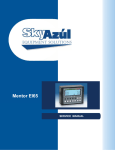
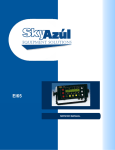
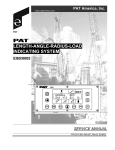

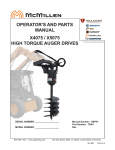
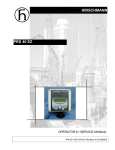

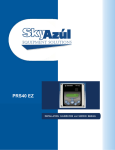

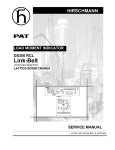
![[输入书名] - Emerson Network Power](http://vs1.manualzilla.com/store/data/005842917_1-6ec1a88a77b6fa212b87a12729f502af-150x150.png)
